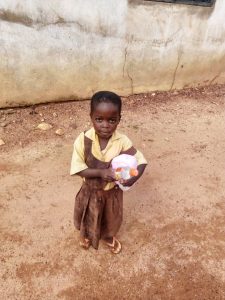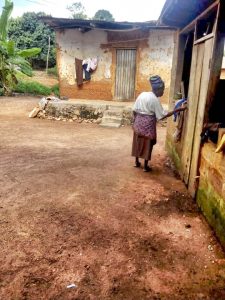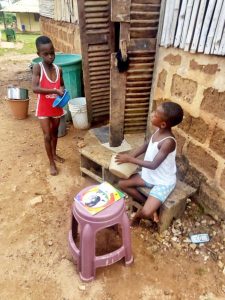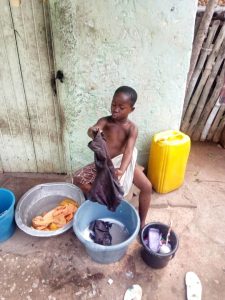This project is made possible through the partnership of WATER CHARITY and the NATIONAL PEACE CORPS ASSOCIATION.
Location
Boamasa, Northern Region, Ghana 
Community Description
The community of Boamasa is predominantly a farming village with a population of about 2,500 people. The village is situated about a one-hour drive from the main town, Walewale, in the northern region of Ghana. Due to the poor nature of road access along the stretch of the village, it is very difficult to travel by car. The easiest way to travel to a nearby town is either by motorbike, bicycle or a donkey ride.
Apart from farming, the second-largest occupation of the people is charcoal making. Farmers grow crops like yams, maize, cassava, millet, sorghum, beans and peanuts. Mostly, families grow enough to eat, and sell a surplus at the nearby market. Income generated is mostly used to purchase personal items and school supplies needed by the family.
The people of the village live a very simple life with limited facilities. Most shelters in the village are built out of clay and straws.
Some of the foods consumed are fufu, ampesi, touzafi, banks, rice and omo tuo.
Regarding education in the village, the community has access to only primary and junior high school facilities.
The main religion of the people is Islam, and about 10% of the people are followers of Christianity.
The people of the village are very strong in community participation, loving and welcoming, which always brings peace and togetherness among them.
Problem Addressed 
Boamasa is known for its extreme dryness. Many water bodies, the main sources of water for household and agricultural use, dry up completely for many months every year, making everyday life and farming activities very difficult. Due to the lack of trees, the water table is very low and wild animals are disappearing.
Project Description
This project is to establish a tree nursery and plant 30,000 trees. Five Peace Corp Volunteers serving communities in the northern part of Ghana will participate.
A fast-growing local tree species will be selected for this project (CEDRELLA). Call To Nature will implement this project and provide technical training. Peace Corp Volunteers Maria, Nathan and Adam will be responsible for maintenance, evaluation and reporting.

The project activities will include:
-Raising a nursery shed
-Filling up poly bags with compost
-Seeding the poly bags
-Installation of the water storage tank and a watering hose
-Transplanting
The main aim of this exercise is to raise the tree seedlings to be planted along waterways in order to keep them from drying and also, to save aquatic life. Some of the trees will be planted in areas such as school compounds, homes and on degraded farmlands.
Other numerous benefits of the project are:
· To recharge groundwater. Deep tree roots make loose pores in the soil so that rainwater can travel through the ground and be available for future use.
· Trees serve as a windbreak by blocking heavy winds, reducing their speed.
· Serving as a habitat for wildlife.
· Leaves of trees trap toxic chemicals that are in the atmosphere.
· Trees aid in promoting rainfall.
· Providing food and medicine.
· Beautification.
· Fertilizing the soil through fallen leaves that break down.
· This project has been designed to also serve as an educational program for school children to learn the practices.
– Erosion and flood control, and many more.
The trees will be planted in other areas, such as school compounds, streets and individual homes.
Project Impact
This project will benefit about 12,000 people.
Project Administration
The project will be administered by Solomon Amuzu, Founder and Director of Call to Nature Permaculture.
Monitoring and Maintenance
A team selected by Call To Nature Permaculture from Boamasa, with the assistance of 3 PCVs, will be responsible for decision making, monitoring, maintenance and reporting. A specialized training will be offered to PCVs and the community to ensure that the project site is well managed to serve its purpose. Once the nursery site is established, CTNP will provide follow-up service for 6 months to ensure the high productivity of the project. After that time, the project will be handed over to the community to take control.
Project Funding
The funds for this project have been advanced by an anonymous donor. Your contribution using the Donate button below will allow us to continue to implement these important environmental projects in Ghana.